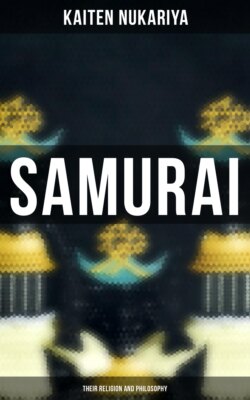Читать книгу Samurai: Their Religion and Philosophy - Kaiten Nukariya - Страница 31
На сайте Литреса книга снята с продажи.
11. Zen in the Dark Age.
ОглавлениеThe latter half of the Ashikaga period was the age of arms and bloodshed. Every day the sun shone on the glittering armour of marching soldiers. Every wind sighed over the lifeless remains of the brave. Everywhere the din of battle resounded. Out of these fighting feudal lords stood two champions. Each of them distinguished himself as a veteran soldier and tactician. Each of them was known as an experienced practiser of Zen. One was Haru-nobu95 (Take-da, died in 1573), better known by his Buddhist name, Shin-gen. The other was Teru-tora96 (Uye-sugi, died in 1578), better known by his Buddhist name, Ken-shin. The character of Shin-gen can be imagined from the fact that he never built any castle or citadel or fortress to guard himself against his enemy, but relied on his faithful vassals and people; while that of Ken-shin, from the fact that he provided his enemy, Shin-gen, with salt when the latter suffered from want of it, owing to the cowardly stratagem of a rival lord. The heroic battles waged by these two great generals against each other are the flowers of the Japanese war-history. Tradition has it that when Shin-gen's army was put to rout by the furious attacks of Ken-shin's troops, and a single warrior mounted on a huge charger rode swiftly as a sweeping wind into Shin-gen's head-quarters, down came a blow of the heavy sword aimed at Shin-gen's forehead, with a question expressed in the technical terms of Zen: "What shalt thou do in such a state at such a moment?" Having no time to draw his sword, Shin-gen parried it with his war-fan, answering simultaneously in Zen words: "A flake of snow on the red-hot furnace!" Had not his attendants come to the rescue Shin-gen's life might have gone as 'a flake of snow on the red-hot furnace.' Afterwards the horseman was known to have been Ken-shin himself. This tradition shows us how Zen was practically lived by the Samurais of the Dark Age.
Although the priests of other Buddhist sects had their share in these bloody affairs, as was natural at such a time, yet Zen monks stood aloof and simply cultivated their literature. Consequently, when all the people grew entirely ignorant at the end of the Dark Age, the Zen monks were the only men of letters. None can deny this merit of their having preserved learning and prepared for its revival in the following period.97
